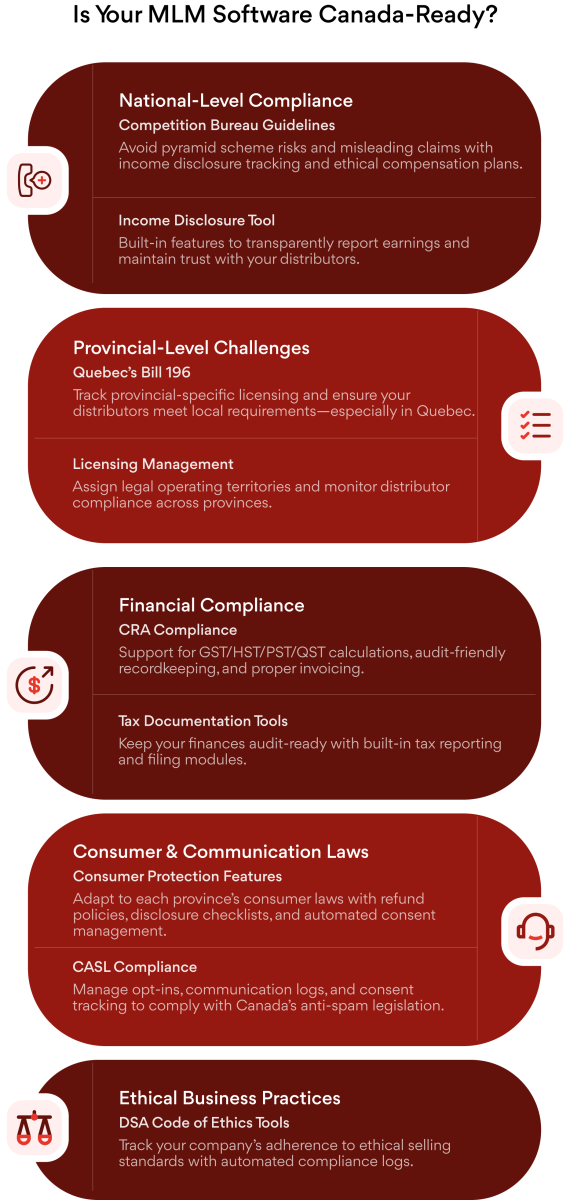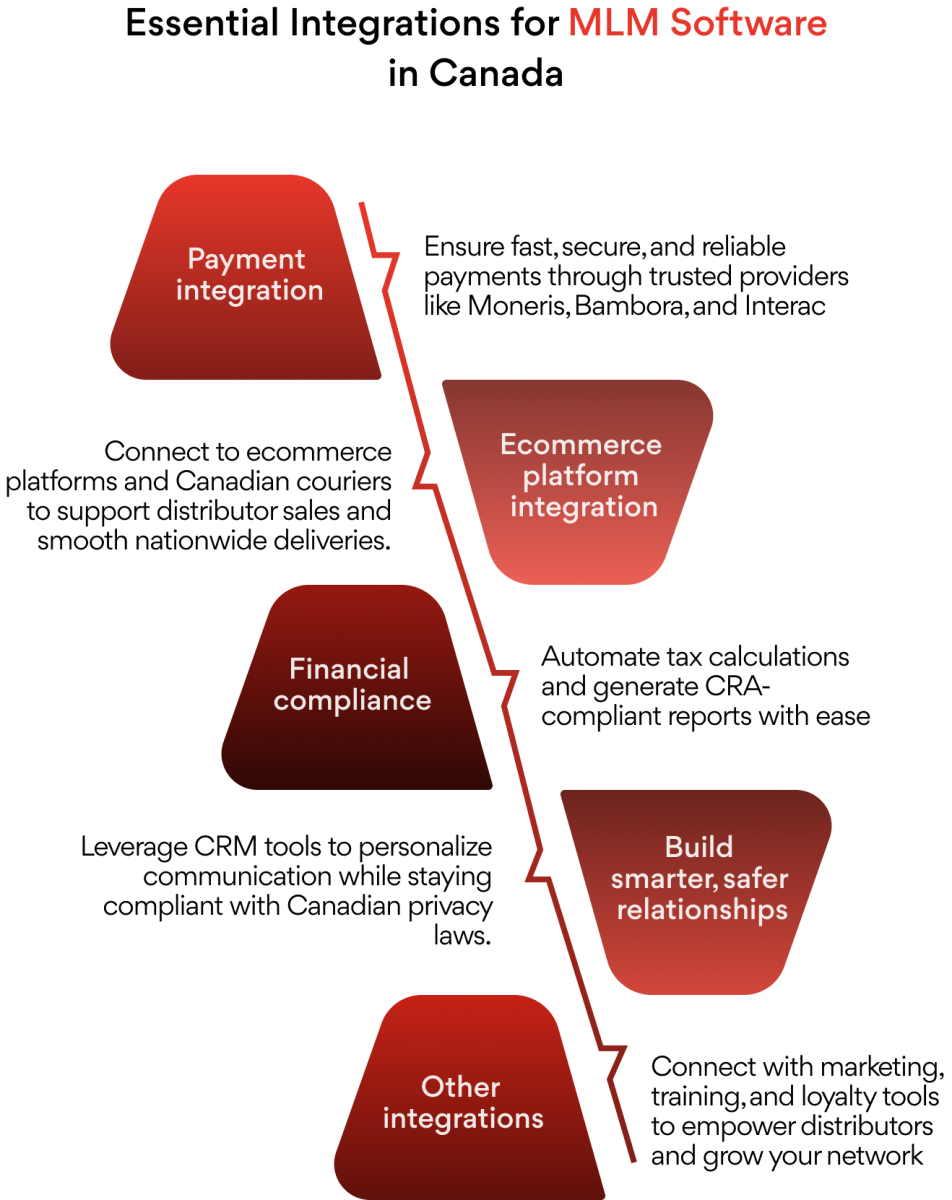MLM Software Buyer's Guide for Canadian Direct Selling Entrepreneurs

Direct sales and network marketing businesses consist of multiple downlines and levels of operations that require an automated management solution. A software that is all-encompassing and comprehensive for managing distributors, tracking sales, calculating commissions, ensuring regulatory compliance fulfills this requirement.
If, as a direct sales entrepreneur in Canada, you are looking for is sustainable growth and scalability in your industry, then investing in an MLM software becomes a necessity. The platform provides all the tools necessary for optimizing operational workflows, and propelling revenue in today's competitive Canadian market. To understand how this software can catapult your business to new heights and boundaries, we would direct you towards this software buyer’s guide for Canadian MLM businesses.
Key features for Canadian MLM companies
For smooth MLM business operations in Canada, your software is your entire operational backbone and not just a backend tool. But not all platforms are built with the Canadian market in mind. So, we suggest some Canadian market-specific features that you should look for when deciding upon which MLM software package you would like to go with. These are hereunder:

Distributor management: An MLM software that gives you the comfort of no spreadsheets, no guesswork—a picture of your entire network at a glance also gives you the ease of managing a distributed sales team, juggling recruitment, distributor onboarding, and performance tracking.

Commission calculation: Canadian compensation plans come with their fair share of complexity, especially when you factor in federal and provincial tax rules. A software that handles it all automatically eases out the discomfort of compensation plan management and handles irritated distributors when they get paid accurately and on time.

Inventory and order management: Inventory delays can kill momentum irrespective of whether you're shipping from Toronto or Calgary. Add to this keeping a real-time check on inventory levels. An effective MLM platform with store management features keeps stock levels updated in real time and connects directly to major Canadian couriers for smooth order fulfillment.

Ecommerce integration: Your online store should feel local. Therefore, when you go online with your MLM business there are a couple of things that need to be in place for a successful ecommerce integration. A bilingual support of English and French, smooth UX, and integration with trusted Canadian payment gateways like Interac and Moneris will make all the difference in customer confidence.

Compliance tools: Staying compliant with Canada’s Competition Bureau and provincial regulations is mandatory. To ensure your legal peace of mind you need to choose software that keeps your business above board and every dollar accounted for.

Replicated websites: Customizable replicated websites for distributors that maintain brand consistency while supporting both official languages.
Canadian regulatory compliance
MLM businesses in Canada operate within a complex legal environment that differs significantly from other markets—and your software needs to reflect that. For starters, the Competition Bureau has clear rules designed to prevent pyramid schemes and misleading income claims. The right MLM software should support ethical business practices, offer built-in income disclosure tools, and ensure your compensation structures don’t cross the line.
But that’s just the federal level. Provincial regulations add another layer of compliance. For instance, Quebec’s Bill 196 introduces specific requirements for direct selling companies, making it essential for your software to include territory-specific compliance features and licensing management that tracks where each distributor is legally allowed to operate.
Additionally, compliance with the Canada Revenue Agency (CRA) means your software must support comprehensive tax recordkeeping, including GST/HST/PST calculations and proper documentation for audits. It should also help you navigate provincial consumer protection laws, which vary widely, and offer features to manage consent and communication in line with CASL (Canadian Anti-Spam Legislation).
The takeaway? Look for software that helps you with compliance management across all jurisdictions—so you can focus on growing your network, not worrying about legal pitfalls. Following is some of the features that will help you with staying compliant as an MLM business in Canada:

Income disclosure tracking and reporting

Transparent compensation plan calculations

Provincial tax handling (GST/HST/PST/QST)

Consumer protection compliance features

CASL (Canadian Anti-Spam Legislation) compliance tools

DSA Code of Ethics adherence tracking

Provincial licensing management

Localization requirements
If you want your MLM business to thrive in Canada, your software needs to feel like it was built for Canada—not just adapted for it. That starts with full multicurrency support, especially seamless handling of Canadian dollars (CAD) alongside smooth conversions for international transactions.
Language is equally important. A truly localized platform must function fluently in both English and French, with complete bilingual support across dashboards, reports, and customer-facing materials.
Don’t overlook the technical details, either—Canadian address formats and postal codes are different from U.S. standards, and accurate handling is crucial for shipping and billing. Plus, many Indigenous communities, particularly in remote areas, have unique addressing protocols your software must respect.
Lastly, a Canadian-first platform should account for local holidays, time zones across six regions (PST to NST), and regional preferences—all of which enhance the distributor experience and build trust within your network.
Besides these, here are some more features you can expect from your MLM software:

Proper handling of Canadian tax formats and calculations

Support for Canadian payment processors

Region-specific reporting templates

Canadian shipping integration options

Indigenous community addressing support

Territory-specific pricing models

Cross-border operations
Internationalization features for Canadian MLM market
For many Canadian MLM businesses, the U.S. isn't just a neighbor—it's a key market. But operating across the border brings its own set of logistical and regulatory challenges. That’s where specialized software features come in.
Look for platforms with cross-border inventory management, which allow you to route products intelligently between Canadian and U.S. warehouses—saving both time and shipping costs. Your software should also automate duty and customs calculations, offering full transparency to both distributors and customers.
For a complete enterprise management, CUSMA/USMCA compliance tools help you stay aligned with trade agreements, while real-time or fixed-rate currency conversion ensures smooth transactions in both CAD and USD. To further streamline operations, integration with cross-border shipping providers like BorderConnect or customs brokers is a must.
And these are just the basics—more advanced features can take your cross-border business to the next level, such as:

Duty and customs automation

Cross-border return processing

Multi-warehouse inventory synchronization

International tax compliance

Cross-border commission handling
Build a compliant and scalable MLM business in Canada with software designed for legal certainty, operational efficiency, and distributor empowerment.
Get Free DemoCloud vs. On-Premises solutions
One of the most important tech decisions you’ll make as a Canadian MLM business owner? Choosing between cloud-based and on-premises MLM software.
Cloud solutions are winning over many companies—especially startups and growing networks—thanks to their lower upfront costs, automatic updates, and easy access from anywhere. That flexibility is especially valuable in a country as geographically vast as Canada, where remote work is now the norm, and distributors may be spread from BC to Newfoundland.
On the other hand, on-premises solutions still have their place. They allow for deep customization, may offer lower long-term costs for larger organizations, and give you more control over your data—an important consideration for companies with strict compliance needs or internal IT teams.
Think about where your company’s headed, how hands-on your tech team wants to be, and what kind of flexibility you need. Many Canadian MLM brands are leaning into cloud platforms for their scalability and simplicity—but the right choice depends on your vision.
Mobile accessibility
In Canada, where mobile is almost a support system; your MLM business needs seamless mobile experiences. Distributors here are known to work in constant motion, juggling sales, enrollments, and team building from smartphones across urban hubs and remote towns.
With that in mind, it would help if you chose MLM software that offers a responsive interface that adapts to any device. A mobile-friendly back office helps reps manage their business from anywhere—at events, during home visits, or on the road. Real-time access to commissions, orders, and team activity is truly a source for comfort. But Canada’s patchy connectivity in rural areas could make online continuity a challenge. Therefore, the offline capability of the device in use is absolutely essential. Here’s what your mobile solution should include:

Mobile-optimized training materials

Location-based distributor mapping

Push notifications for important updates

NFC/QR payment processing options
Integration capabilities
A modern MLM operation in Canada isn’t complete without strong integration capabilities. Your software should be able to work flawlessly with Canadian payment processors like Moneris, Bambora, and Interac to ensure hassle-free, secure transactions. It should also be able to link up with popular ecommerce platforms used by your distributors to help them manage additional sales channels.
A facilitating MLM software also ought to have functionalities for shipping integrations with Canada Post, Purolator, and regional couriers. This is particularly essential for deliveries across remote and rural areas. Besides this software that helps with financial reporting and CRA compliance can make your business operations and transactions more comfortable. A good CRM integration supports personalized communication strategies—the latter being critical in a country with strict privacy laws.
Beyond the basics, ensure your platform connects with:

Social media platforms for marketing

Email marketing services

Video conferencing tools

Inventory management systems

Canadian loyalty program integrations


Commission structures and compensation plans
MLM businesses in general and Canadian MLM businesses in particular need more than just basic payout tools. Therefore, your chosen software should be built to handle complex, multi-tiered commission structures that include qualifications, bonuses, and incentives mentioned in your compensation plan.
Equally important is transparency. This not only builds trust but also boosts motivation—especially when paired with real-time commission tracking. An MLM software should give distributors a clear visibility into how their commissions are calculated and where they stand in terms of performance and ranking.
Next in line would be tax compliance functionalities. Your software must support Canadian-specific tax handling. This includes proper T4A reporting for independent contractors, which ensures your business stays on the right side of the CRA while keeping distributors informed and confident. Various Compensation plans include the following:

Rank advancement tracking

Promotion and bonus management

Team volume calculations

Holdback provisions for returns and chargebacks
Reporting and analytics
For effective reporting MLM software provides dynamic dashboards that deliver instant visibility into key performance metrics aligned with Canadian market trends. There have to be customizable MLM reporting tools that lets you monitor KPIs specific to your operations across provinces. In addition, predictive analytics should be a functionality for uncovering emerging patterns and highlighting areas for strategic growth within Canada's regional markets. To further aid analytics easy-to-read visuals that simplify complex data and make insights actionable for distributors at all levels should be part of software features. Built-in provincial comparisons that support smarter resource distribution across varying markets and Seasonal analytics that equip you to adapt to Canada's shifting consumer behavior throughout the year—all form a part of the MLM software features such as:

Distributor performance metrics

Product sales analysis by region

Recruitment and retention statistics

Commission forecasting

Inventory turnover report

Provincial market penetration analysis
Training and support
A successful onboarding procedure sets your team up for success from day one. This ensures that they’re confident using the software right away. An industry-specific training ensures your business stays compliant with Canadian direct selling laws and operates efficiently within local norms. Canadian-based technical support that is available across time zones means help is always within reach when challenges arise. To resolve technical and operational problems a continuous stream of training updates should keep everyone aligned with new features and evolving best practices. Self-serve tools like knowledge bases should be there to empower distributors to troubleshoot independently. Most important of all user communities should be live to encourage collaboration and learning among Canadian peers.

Live training sessions

Video tutorials

Documentation in both English and French

Dedicated account management

User forums and communities

Canadian market strategy consultations
Security and data protection
An MLM software requires data encryption that protects sensitive information at rest and in transit. To ensure data security, periodic audits are essential for identifying and addressing potential vulnerabilities. Additionally, compliance with Canadian privacy laws (PIPEDA and provincial privacy laws) is crucial for operating legally. Besides, with an MLM software you can ensure secure payment processing to protect all kinds of financial transactions. Another feature required is that of disaster recovery plans that ensure business continuity in case of system failures. Along with all of the above are the data residency, security management options that allow you to keep sensitive information on Canadian servers, which may be preferred or required for certain industries, such as:

Two-factor authentication

Role-based access controls

Regular security updates

Data backup and recovery options

Compliance with international security standards

Canadian data residency options
Seasonal business support
Canadian direct selling businesses face seasonal challenges. To address the issue robust seasonal planning tools are needed to help manage inventory and promotions during Canada's distinct seasons. Holiday-specific campaign management features are imperative for an MLM software to streamline special promotions during peak selling periods. A weather-triggered marketing automation is also required to enable timely promotions based on regional weather patterns. Tax season preparation tools simplify year-end processes for distributors should not be overlooked either. Lastly, Seasonal analytics are also needed to help identify patterns and opportunities unique to Canadian consumer behavior during different times of the year. The following are the imperatives for the MLM software package, at a glance:

Seasonal inventory forecasting

Holiday campaign templates

Weather-triggered promotions

Tax season preparation tools

Seasonal training modules
Emerging technologies
Modern MLM software has to embrace emerging technologies to stay competitive. AI is just one such technology. AI-driven features can anticipate customer needs, streamline inventory, and deliver personalized insights tailored to Canadian consumer behavior. Blockchain integration is another technological advancement that offers secure, transparent records of commissions and transactions. Implementation of Virtual Reality enables engaging product demos and training, ideal for Canada’s vast and varied geography. Marketing automation tools simplify campaign management while ensuring compliance with Canadian anti-spam laws. And finally with advanced analytics, you can gain sharper visibility into distributor trends and regional performance, helping you to scale smarter. Following is some of the emerging technologies that truly helps to keep the MLM software upgraded and with the times:

Chatbots for customer and distributor support

Predictive analytics for inventory management

Voice-activated interfaces

Augmented reality product demonstrations

Machine learning for personalized distributor training

Digital wallet integrations for commission payments
MLM software selection checklist
Not all MLM software is created equal—especially when you're operating in the diverse and regulation-heavy Canadian market. Whether you’re launching a new direct selling business or scaling an established one, choosing the right platform can make or break your success. From compliance and bilingual support to mobile access and cross-border logistics, there are several non-negotiables to look out for.
Use this quick checklist to ensure your MLM software ticks all the boxes for Canadian market readiness:

Supports bilingual operations (English/French)

Complies with Canadian regulations (Competition Bureau, CASL, PIPEDA)

Handles Canadian tax calculations and reporting

Offers multicurrency support with CAD as primary currency

Provides mobile access with offline capabilities

Integrates with Canadian payment gateways and shipping providers

Supports your specific compensation plan structure

Offers comprehensive reporting and analytics

Includes robust security features and data protection

Provides training and support in Canadian time zones

Scales with your business growth

Offers competitive pricing with transparent fee structure

Includes regular updates and new feature development

Has positive reviews from other Canadian MLM companies

Demonstrates long-term stability and reliability

Supports Indigenous community addressing

Offers Canadian data residency options

Handles cross-border operations efficiently

Provides provincial licensing management

Includes seasonal business support features
Case studies and success stories
Read from our customers how we have been helping MLM organizations stay one step ahead of rising competition and customer expectations.
Stay ahead in Canada’s direct selling market with an MLM platform built for CRA compliance, bilingual support, and seamless integration with local payment systems.
Get Free DemoCost considerations
When budgeting for MLM software, consider the following.
Initial implementation costs can vary significantly between providers, from a few thousand to tens of thousands of dollars depending on complexity and customization needs. Monthly subscription fees typically range from $50-$500 per administrator user, with additional costs for distributor access. Per transaction fees may apply for payment processing, often 2-3% for Canadian payments. Consider the total cost of ownership, including implementation, training, ongoing support, and potential customization. Many providers offer tiered pricing based on distributor count or transaction volume, allowing you to start small and scale as your business grows. Canadian-specific customizations like bilingual support and provincial tax handling may incur additional costs that should be factored into your budget.

Implementation fees

Monthly or annual subscription costs

Per-user or per-distributor fees

Transaction costs

Support and maintenance fees

Canadian compliance feature costs
Making the final decision
Selecting the right MLM software is crucial for your Canadian direct selling business.
An MLM software platform integrates various functionalities, such as genealogy tracking for visualizing downline structures, commission engines for handling intricate compensation plans (binary, matrix, unilevel, etc.), inventory management, e-wallet systems for payouts, marketing tools for distributor support, and comprehensive reporting and analytics for strategic decision-making. An advanced MLM software solution might also incorporate ecommerce capabilities, CRM integration, and mobile accessibility to empower distributors and smoothen operations.
Remember that the right MLM software should grow with your business, providing the tools you need today while offering the flexibility to adapt to tomorrow's challenges in the dynamic Canadian direct selling landscape.
